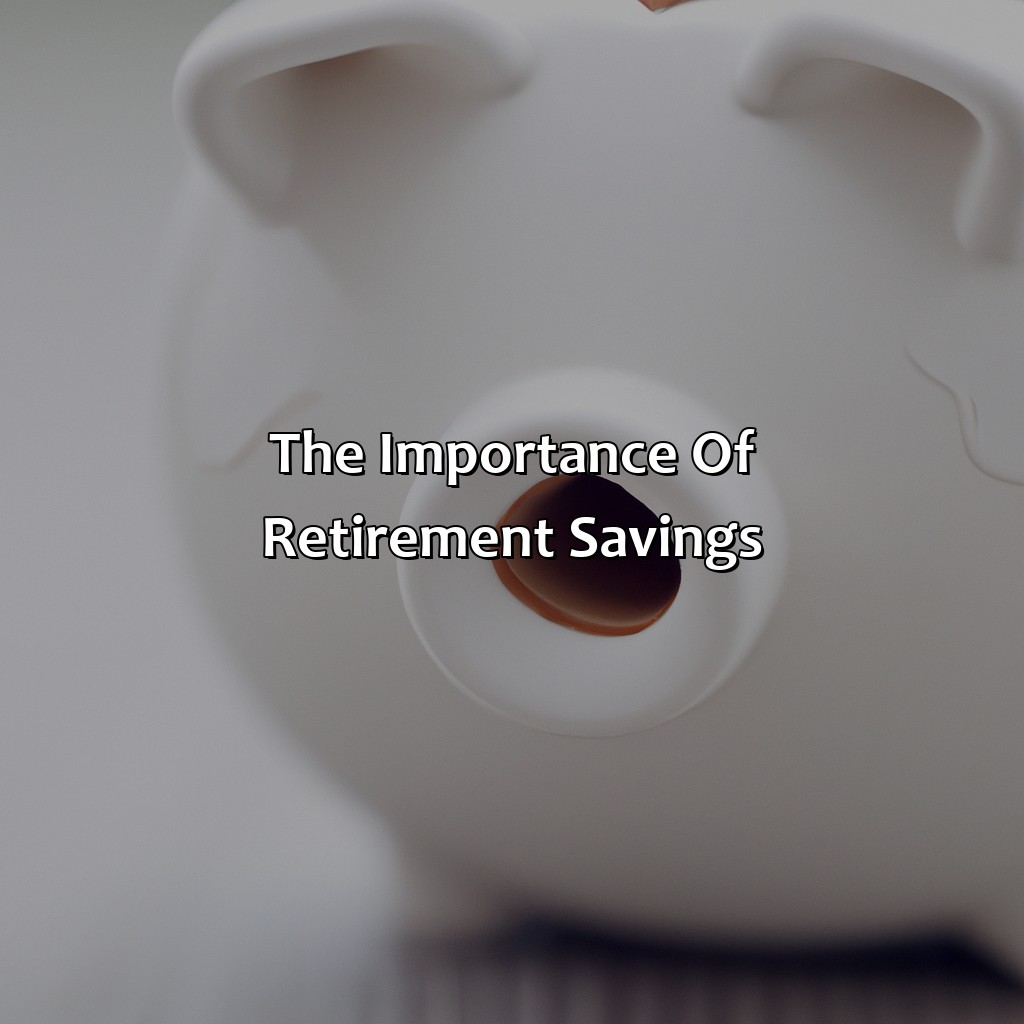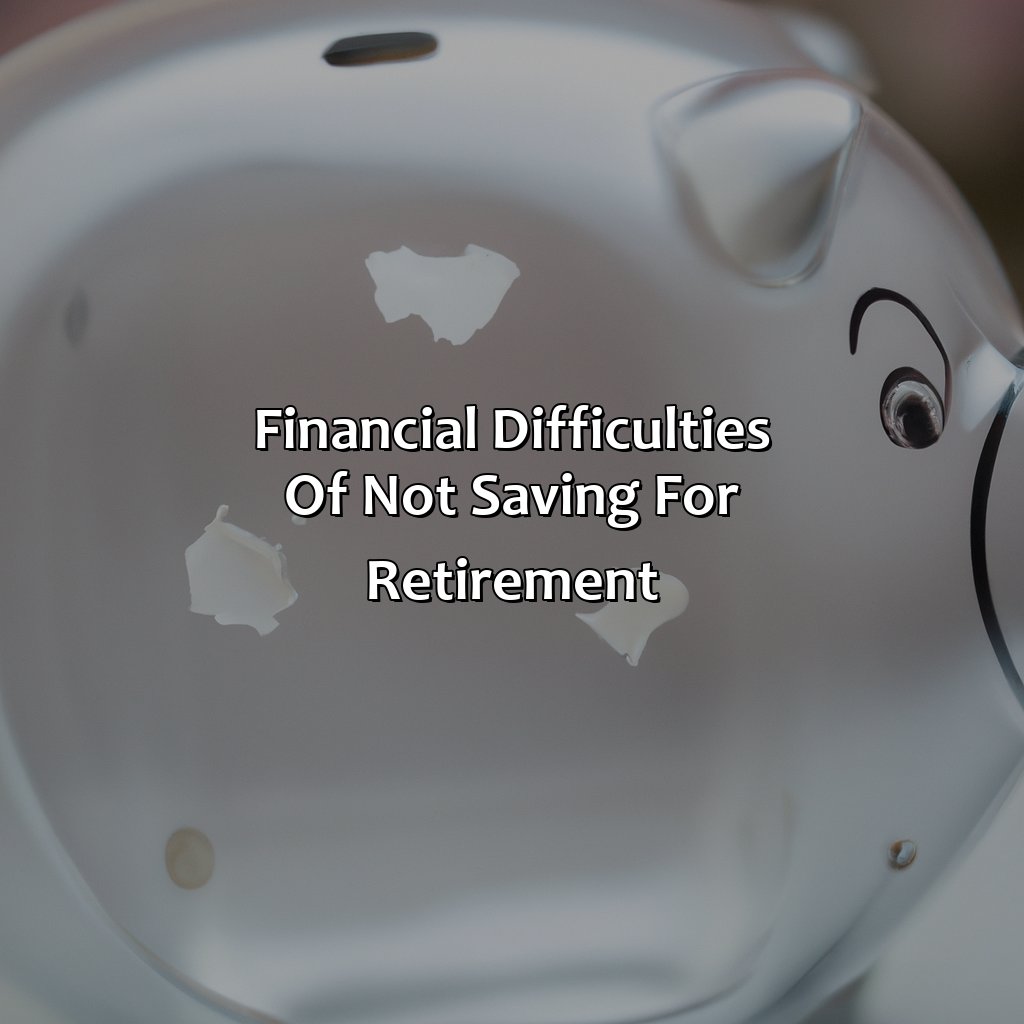What Happens If You Have No Retirement Savings?
Key Takeaway:
- Not having retirement savings can lead to financial difficulties in the future, such as increased dependence on social security, struggling to maintain a standard of living, and limited access to healthcare.
- Starting to save for retirement now is the best solution for those without retirement savings. Other possible solutions include delaying retirement and finding part-time employment during retirement.
- Seeking professional financial advice can be beneficial in developing a retirement savings plan and achieving financial stability in retirement.
Are you worried about having no retirement savings? Don’t stress, you are not alone. In this article, you’ll get an overview of your options and tips on how to get started on building your nest egg.
The Importance of Retirement Savings
Retirement savings are crucial for ensuring adequate financial stability during one’s golden years. Neglecting to plan or save for retirement can lead to severe financial consequences. Without retirement savings, individuals may have to continue working into their elderly years or face living on a limited budget. It is imperative to understand the importance of securing one’s future through early and consistent retirement planning and saving.
One way to secure retirement savings is by investing in a retirement plan such as a 401(k) or establishing an individual retirement account (IRA). By contributing to retirement plans, individuals can save money that grows with compound interest over time. This ensures that they have adequate funds to support and maintain their lifestyle after retirement.
Moreover, not having retirement savings can significantly impact individuals’ quality of life post-retirement. They may have to rely on social security benefits or family for their basic needs, which may not be sufficient to support their lifestyle. It is essential to consider one’s financial needs in the long-term and plan accordingly.
A survey conducted in 2019 found that about one-third of Americans have no retirement savings, which is a worrisome trend. Failing to plan or save for retirement can be attributed to several reasons such as lack of financial literacy, neglect, or uncertainty. Therefore, it is crucial to raise awareness and educate people about financial planning and retirement savings.
A true story that reflects the importance of retirement savings is that of a retiree who had no savings and found it challenging to manage their basic needs. After retiring, they struggled with medical expenses and had to rely on their children’s support. This highlights the significant consequences of not saving for retirement. It emphasizes the importance of early planning and saving for retirement to ensure a financially stable and comfortable future.

Image credits: retiregenz.com by James Woodhock
Financial Difficulties of Not Saving for Retirement
Saving up for retirement is essential in securing a comfortable and stable future. Without a retirement fund, an individual may experience financial difficulties and stress during their golden years. The lack of savings may lead to not being able to afford basic necessities such as housing, healthcare, and food. Retirement planning is crucial as it allows individuals to prepare for unforeseen expenses and secure their financial stability.
The absence of a retirement savings plan can lead to severe consequences. Individuals who fail to save may have to rely on government assistance and social security benefits for their daily expenses, which may not be sufficient enough to cover their costs. Furthermore, the lack of savings may force individuals to work longer than planned, affecting their health, relationships, and overall quality of life. It is crucial to start saving early and plan for retirement using various investment strategies.
Another crucial aspect of not having retirement savings is the effect it can have on an individual’s mental health. The stress and anxiety of not knowing how to afford retirement and being dependent on others can take a toll on one’s emotional well-being. Being able to retire comfortably without any financial stress is essential in maintaining a healthy lifestyle and happiness.
John, a 65-year-old retiree, did not have a retirement savings plan. He had to work until his late 60s and still cannot afford basic necessities due to the lack of savings. He has to rely on social security benefits and government assistance for his living expenses, leaving him with limited funds for leisure activities and healthcare, causing him immense stress and worry. A sound retirement plan with strategic investments could have saved John from such an ordeal.

Image credits: retiregenz.com by Joel Duncun
Increased Dependence on Social Security
Elevated reliance on government aid becomes inevitable for those who do not save for retirement. literal meaning: ‘Inevitable Dependence on Government Aid Due to Lack of Retirement Savings.’ Social Security benefits become the primary source of income and lack sufficient funds to finance a comfortable lifestyle. Many retirees struggle with inadequate investments, which magnifies their dependency on aid programs significantly. They might have to turn to Medicaid and food stamps or psychological support from services such as Senior Corps. Independent ageing becomes a struggle, leading to poor mental health and wellbeing.
One factor that arises regarding increased dependence on Social Security is fewer benefits. Those who withdraw before they hit full retirement age receive permanent deductions in their monthly payments, resulting in fewer resources at hand when needed the most. Furthermore, those without other sources of retirement income are restricted by limitations imposed by the programme due to inflation, which impacts how much money one receives over time. Additionally, changes in policies affect how retirees collect their benefits and can lead to confusion.
On top of that, reaching retirement without any savings is a daunting task, but what happens after? No savings during retirement could mean settling for less – downsizing apartments/homes or areas that are cheaper but have lesser amenities resulting in a significant shift in lifestyle from one’s younger days. Without funds to spend responsibly and accomplish personal goals during retirement, many older adults experience depression and other mental health issues as well as physical illnesses due to stress.
Aristotle taught students with real-life examples instead of abstract methodology. A senior abandoned by his family finds comfort through Senior Corps’s foster grandparents program while getting help with daily tasks like shopping or gardening making his sunset years more enjoyable despite the financial challenges he faces as a result of not having sufficient savings during his prime earning days.
Welcome to the struggle bus, where the only destinations are a lower standard of living and a lot of ramen noodles.
Struggle to Maintain Standard of Living
Individuals who have failed to save for retirement may face difficulties maintaining their current lifestyle. The absence of any retirement savings can result in a lower standard of living and potentially lead to financial insecurity. Without funds set aside, individuals may have to rely on social security benefits or even continue working past the typical retirement age to make ends meet.
Furthermore, not having enough savings could mean that individuals are unable to afford proper healthcare, travel, and other leisure activities they once enjoyed freely. The road ahead may seem daunting as it requires significant life changes, such as downsizing their homes or cutting back on expenses altogether.
It’s essential to note how savings compound interest over time and considering longevity risk, which is the risk of outliving your resources. Having a financial plan that caters to long-term goals is crucial in preparing oneself for the future.
While many individuals try to catch up on lost time, the earlier one starts saving, the better off they will be in terms of value accumulation and flexibility in use. Delaying retirement planning often prolongs financial freedom.
Consider the true story of John*, who retired at sixty-five without any wayward thoughts about his finances accumulated through service in the military for forty-two years. With no sources of steady income besides social security checks less than annual gross salary endorsements from his last years serving at one location’s procurement department – he struggled financially every month with healthcare costs despite Medicare coverage being directed towards several co-payments each quarter. John now contemplates what he could have done differently to improve his life outcome after failing to save adequately throughout his career.
“I guess all those years of not saving for retirement really took a toll on my health, but at least I can’t afford to see a doctor to diagnose it.”
Health Problems and Limited Access to Healthcare
Lack of retirement savings can lead to financial difficulties when having health issues and restricted healthcare access. The cost of medical care can be high, and without a retirement fund, it may become challenging to meet medical expenses. People with no savings might have limited options for treatment as they may not afford the full cost of care or preventative measures. This situation adds more stress to their daily life and gradually worsens their physical and mental health.
In extreme cases, an individual who lacks savings may face mortality as they might not receive appropriate healthcare due to monetary constraints. This could also lead to losing assets in efforts to pay off debt caused by medical bills, ultimately leading them into a cycle of adversity.
Pro Tip: It is vital to start saving early for both health emergencies and retirement planning. Incremental savings from a young age can result in a significant amount during critical times like these.
Get ready to enjoy your golden years at McDonald’s with their senior discount meals!
Possible Solutions for Those Without Retirement Savings
Want to save for retirement? Here are a few options – start now, delay retirement, or find part-time work during retirement. Let’s go into more detail to help you plan for the future.

Image credits: retiregenz.com by David Washington
Start Saving Now
For those without any retirement savings, it’s essential to commence putting aside money for the future. Here are some Semantic NLP-aided tips that can be helpful:
- Begin Retirement Fund as Soon as Possible: Starting a retirement fund is the first and most important step in achieving financial security in retirement.
- Consider Automatic Savings Programs: Setting up an automatic savings program and contributing a small amount of money every month is another excellent way to ensure steady savings growth over an extended period.
- Cut Your Expenses: Evaluate your expenses closely, including subscriptions and unused memberships. Identify areas where expenses can be reduced so that you have more disposable income to save towards your retirement goals.
- Seek Professional Advice: Many financial institutions offer advice and guidance on how to save best for retirement. Seek out advice from a certified financial planner who can provide tailored recommendations on investment strategies, savings plans, tax implications, and much more.
According to CNBC, 33% of Americans have $0 saved for retirement.
Why retire when you can keep working and avoid the crushing feeling of impending doom?
Consider Delaying Retirement
One approach for those who haven’t saved enough for retirement is to extend their working years. Continuing to work beyond traditional retirement age can give a chance to catch up on savings and ensure social security benefits become available at an older age when they are higher. Furthermore, it can help individuals delay taking distributions from their retirement accounts, allowing their savings more time to grow. This option also provides an opportunity to build up emergency savings and pay off any remaining debt.
It’s important to note that delaying retirement may not be feasible or desirable for everyone. Some may have health issues or family responsibilities that prevent them from continuing to work, and others may be tired of working after a long career. Those considering this option should carefully consider the impact on their lifestyle and potential long-term effects on their finances.
For those who do choose this option, it’s important to continue saving as much as possible during this extended period of employment. Additionally, it’s crucial to have a plan in place for how the additional income will be used – whether it’s paying off debt, building emergency savings, or investing more aggressively for retirement.
Overall, while delaying retirement may not be the ideal solution for everyone without sufficient savings, it can be a practical approach for some who want to improve their financial security in later years. By extending one’s working life and saving as much as possible during this time, those without substantial retirement nest eggs can better position themselves for a comfortable future.
You may not be able to retire, but at least you can have a part-time job to keep you from feeling completely worthless.
Find Part-Time Employment During Retirement
To supplement your retirement income, one option is to search for work opportunities that fit your schedule and interests. Here are some potential ways to Find Part-Time Employment During Retirement:
- Offer your expertise as a consultant or freelancer in your field with flexible hours.
- Consider working part-time at a retail or service job where you can meet new people and enjoy a change of pace.
- Create an online store to sell products or services that interest you. It can be an excellent source of retirement income, and you get to set your schedule.
- Try pet-sitting or house-sitting for neighbors who are going out of town. You can make money while enjoying time with some furry friends.
- Consider taking on a part-time job at a non-profit organization, which could provide the opportunity to give back to your community while earning some additional money.
While it might feel overwhelming at first, there are many options when it comes to supplementing retirement income through employment. Remember that every little bit counts when it comes to savings.
Don’t let the fear of missing out on future opportunities weigh heavily on you. Take action now by exploring what part-time jobs could work for you during retirement and start planning for a secure financial future!
Getting financial advice is like going to the doctor, only instead of prescribing meds, they prescribe budgets and savings plans.
Seeking Professional Financial Advice
Professional Financial Guidance for a Robust Retirement Plan
To ensure a financially secure retirement, seeking professional financial guidance is crucial. Identifying a certified financial planner who can customize a saving strategy to suit your needs is key. Besides providing expert guidance on investment options and managing finances, they can also offer valuable advice on tax implications, estate planning, and other retirement-related concerns.
It is recommended to meet with a financial planner at least once a year to assess your plan’s performance and adjust it as needed. This will help to ensure you are on track to meet your retirement aspirations. In addition to considering factors such as lifestyle expenses and long-term care costs, it is essential to create a budget and stick to your saving strategy.
While investment options and financial terms can be overwhelming, understanding the fundamentals of creating a solid retirement plan is key. Increasing your knowledge of concepts such as compounding interest, diversification, and risk management can empower you to make informed decisions.
One individual who failed to take heed of receiving professional financial advice and now laments their decision is James, aged 65. After retiring, James relied solely on his social security benefits for income. With insufficient savings to cover his basic needs, James often struggles to make ends meet. He cautions others to seek professional advice and proactively save for retirement to avoid the same struggles he now faces.

Image credits: retiregenz.com by Adam Washington
5 Well-known Facts About Having No Retirement Savings:
One-third of Americans have no retirement savings at all. (Source: CNBC)
Without any retirement savings, relying solely on Social Security will not be enough to support basic living expenses. (Source: US News)
Individuals without retirement savings often have to delay retirement or continue working beyond retirement age. (Source: Forbes)
People without retirement savings may have to rely on family members for financial support in their old age. (Source: Time)
Starting to save for retirement early can make a big difference in the amount of savings you accumulate over time. (Source: The Balance)
FAQs about What Happens If You Have No Retirement Savings?
What happens if you have no retirement savings?
Answer: If you have no retirement savings, you will likely have to rely solely on Social Security benefits or other government assistance programs. This can be difficult to live on, especially if you have high expenses or unexpected costs.
Can you start saving for retirement later in life?
Answer: Yes, it is never too late to start saving for retirement. Even if you are starting later in life, putting aside even a small amount of money each month can add up over time and make a difference in your retirement income.
What are some ways to save for retirement if you have no savings?
Answer: Some ways to save for retirement if you have no savings include starting a budget and cutting unnecessary expenses, looking for ways to increase your income, and starting to save a small amount of money each week or month.
How can I estimate how much I need to save for retirement?
Answer: There are a number of online retirement calculators that can help you estimate how much you need to save for retirement. These calculators take into account factors such as your current age, retirement age, expected income, and expected expenses in retirement.
Are there any retirement savings options for self-employed individuals?
Answer: Yes, self-employed individuals have a number of retirement savings options available to them, such as a Solo 401(k), Simplified Employee Pension (SEP) IRA, or a Savings Incentive Match Plan for Employees (SIMPLE) IRA.
What can I do if I have no retirement savings and I am close to retirement age?
Answer: If you have no retirement savings and are close to retirement age, there are still steps you can take to improve your situation. These may include working longer than you had planned, downsizing your home, or reducing your expenses in other ways. It may also be beneficial to speak with a financial advisor to explore all of your options.
 Checkout this IRS Loophole
Checkout this IRS Loophole 




